
Rubber Soul is the sixth studio album by the English rock band the Beatles. It was released on 3 December 1965 in the United Kingdom on EMI's Parlophone label, accompanied by the non-album double A-side single "We Can Work It Out" / "Day Tripper". The original North American release, issued by Capitol Records, contains ten of the fourteen songs and two tracks withheld from the band's Help! (1965) album. Rubber Soul was described as an important artistic achievement by the band, meeting a highly favourable critical response and topping sales charts in Britain and the United States for several weeks.
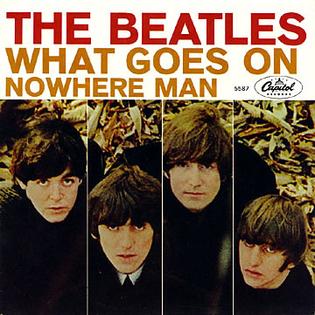
"What Goes On" is a song by the English rock band the Beatles, featured as the eighth track on their 1965 album Rubber Soul. The song was later released as the B-side of the US single "Nowhere Man", and then as the tenth track on the North America-only album Yesterday and Today. It is the only song by the band credited to Lennon–McCartney–Starkey and the only song on Rubber Soul that features Ringo Starr on lead vocals. The song reached number 81 on the US Billboard Hot 100 in 1966.
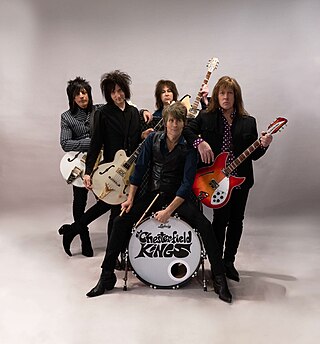
The Chesterfield Kings are a rock band from Rochester, New York, who began as a retro '60s inspired garage band, and evoking the sounds and styles of 1960s psychedelic rock music. The current lineup features longtime members: Andy Babiuk, Mike Boise, Jeff Okolowicz, Ted Okolowicz, and newcomer John Cammarosano. Former singer Greg Prevost left the band in 2009 to pursue a solo career. The band, named after a brand of unfiltered cigarette, was instrumental in sparking the 1980s garage band revival that launched such groups as the Unclaimed, Marshmallow Overcoat, The Fuzztones, The Pandoras, Mystic Eyes, The Cynics, the Secret Service, and the Stomachmouths.

William Malone is an American horror filmmaker who directed several movies such as the 1999 remake House on Haunted Hill, Scared to Death, Creature, and FeardotCom.
The Choir was a garage rock band largely active in the greater Cleveland area from the mid-1960s into the early 1970s. Originally called The Mods, their largest commercial success came with the release of their first single "It's Cold Outside" in December 1966. The song, considered to be a classic of the garage rock era, was featured on Pebbles, Volume 2, one of the earlier garage rock compilation LPs. The flipside, "I'm Going Home" was included as a bonus track when the Pebbles album was reissued as a CD, and it can also be found on a garage rock compilation LP on Ohio bands, Highs in the Mid-Sixties, Volume 9. The Choir is well known for containing three of the four original members of Raspberries.

The Outcasts are an American garage rock band from San Antonio, Texas that released a total of five singles between 1965 and 1967. Their best-known songs are "I'm in Pittsburgh ", and "1523 Blair". Their recordings have been reissued on a number of compilation albums. According to the Ugly Things compilation album notes, they are the most recognized band of this name that were active in the mid-1960s, including another popular band from Manhasset, New York.
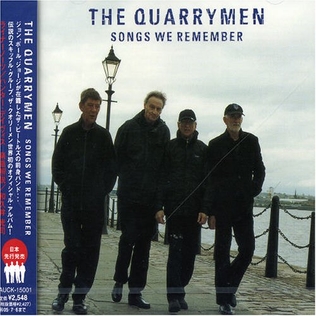
Songs We Remember is the third album by the re-incarnated version of the Quarrymen, which was the band that eventually evolved into the Beatles. It is also the final album to feature founder member Eric Griffiths before his death in 2005.
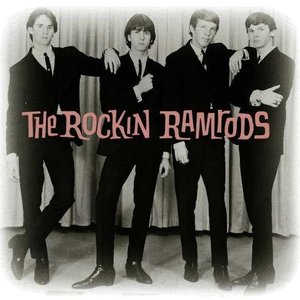
The Rockin’ Ramrods were an American garage rock band from Boston, Massachusetts, who were active in the 1960s and early 1970s. Along with the Barbarians, the Remains and the Lost, they were one of the most popular acts in the Boston area. While they did not achieve national success, their work is today well-regarded by garage rock collectors and enthusiasts. They are perhaps best remembered for the 1964 protopunk anthem "She Lied." Though best known as the Rockin’ Ramrods, they recorded under other names. They recorded one single as the GTO's.

The Palace Guards were an American garage rock band from Metairie, Louisiana, a suburb of New Orleans, who were active in the mid to late 1960s. Their approach was highly influenced by the British Invasion popularized by bands such as the Beatles and the Rolling Stones but was also informed by the folk rock and soul sounds coming out of America during the period. Drummer Frank Bua would later go on, years later, to play with the popular roots rock and funk group, the Radiators.

The Dearly Beloved were an American garage rock band from Tucson, Arizona, originally known as the Intruders, who began as an instrumental surf rock combo, but eventually incorporated vocals into their sound after the rise of the British Invasion. After recording their first single as the Intruders, they changed their name to Quinstrels, recording one single under that moniker, but later settling upon the name for which they are best known, the Dearly Beloved. Along with the Grodes, they became one of the top groups in the Tucson area, scoring a #1 hit in there, and were on the cusp of breaking to a wider national audience, even briefly recording with Columbia Records and receiving some airtime on radios stations in other parts of the country, but were unable to maintain the momentum long enough to achieve wider success. Their work is nonetheless highly regarded amongst garage rock and psychedelic enthusiasts.

The Quests were an American garage rock band formed in Grand Rapids, Michigan, in 1964. Recording for Fenton Records between 1966 and 1967, the group released three singles in their career. Although the group was hampered by a lyrical controversary surrounding one of their tunes, they achieved regional popularity among their teen fanbase with the original songs "Scream Loud" and "Shadows in the Night". Since the Quests' disbandment, their material has been well-documented on garage rock compilation albums and prompted surviving members to occasionally reunite.

Tonto and the Renegades were an American garage rock band from Grand Ledge, Michigan who were active between 1964 and 1969. They were formed by students from Grand Ledge High School and their name derived from the nickname of their bass player, Gary Richey, who because of his Native American heritage was referred to as "Tonto" by his friends at school. The group had several hits in the Southern Michigan region in 1966 and 1967. By the late 1960s group was being courted by major record labels, when the prospect of the Vietnam War draft caused two members to leave the band, resulting in the group's breakup. The intervening years have witnessed a revival of interest in the band's music amongst garage rock enthusiasts. Tonto and the Renegades are now best known for their song "Little Boy Blue", which is today regarded as a garage rock classic. In 2012 Tonto and The Renegades were inducted into the Michigan Rock and Roll Legends online Hall of Fame.

Scream Loud!!! The Fenton Story is a garage rock compilation consisting of songs released by Fenton Records in Grand Rapids, Michigan and the assorted vanity labels that it had pressed and distributed for various regional acts, primarily from western Michigan in the 1960s, and is available on identical LP and CD formats.* The set focuses on basic upbeat and rocking material, but includes a couple of odd and more eclectic expetions. Fenton's founder was musician and entrepreneur Dave Kalmbach, who intended the label to be a place where un-established groups could have a place to record on either the Fenton label itself or on their own vanity labels, which were usually given special custom names chosen by the bands and their management, often under the arrangement that the bands would pay themselves for most of the recording and pressing costs, but receive a certain share in royalties. Commenting on how these recordings more-or-less function as aural snapshots taken from the bygone scrapbook of a more innocent time, Stephen Thomas Earlewine commented:

The Jades were an American garage rock band from Sparta, Michigan who were active in the 1960s. They were one of the most popular bands in Sparta and West Michigan and cut two singles for Fenton Records owned by Dave Kalmback, who eventually became the group's manager. They are remembered for songs such as "Please Come Back" and the topical "Confined Congregation", and their work is highly regarded today by garage rock collectors and enthusiasts.
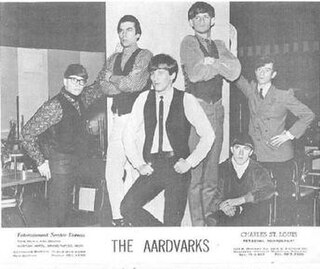
The Aardvarks were an American garage rock band from Muskegon, Michigan who were active between 1964-1968. They recorded three singles, two of which were issued on labels of Dave Kalmback's Fenton Records based in Sparta, Michigan. The group scored a local hit with "I'm Higher than I'm Down", which is now considered a garage rock classic, and several of their songs have been included in garage rock compilations.

The Escapades were an American garage rock band from Memphis, Tennessee who were active in the 1960s. They became one of the most popular groups in the Memphis area during the mid-1960s and recorded two singles. "I Tell No Lies", the A-side of their debut single, became a big hit in Memphis and around the South. They were signed to Verve Records, who released their follow-up, "Mad, Mad, Mad", which featured a fuzz-toned guitar line. Their work is highly regarded by garage rock enthusiasts and collectors and has appeared on various compilations.
The Jesters were an American garage rock band from Memphis, Tennessee who were active between 1963-1964 and 1965–1967. They became one of the most popular groups in the Memphis area during the time. Led by Teddy Paige, they were unique amongst garage bands of the time in that they did not display any of the musical influences of the Beatles and the British Invasion, but reflected rather the a style of early rock and roll, rockabilly, and blues. Their work has attracted the interest of garage rock enthusiasts in recent years.

The Kings Ransom were an American garage rock band from Allentown, Pennsylvania who were active from 1965 to 1968 and were a popular act in the Lehigh Valley area, as well as around Philadelphia. Their record "Shame" became a hit in Milton, Pennsylvania and received airplay in Michigan. In the intervening years the Kings Ransom's music has come to the attention of garage rock enthusiasts with the release of several of their songs on compilations such as Allentown Anglophile and Teenage Shutdown! Teen Jangler Blowout!
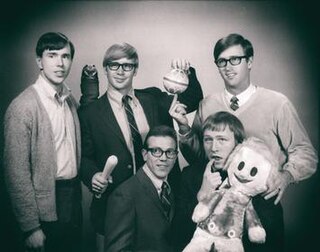
The Kitchen Cinq were an American garage rock band from Amarillo, Texas active in the 1960s, whose lineup included guitarist and songwriter Jim Parker. They evolved out of the Illusions and eventually changed their name to the Y'alls, releasing records under both names, and enjoyed regional success before moving to Los Angeles, where they signed with Lee Hazlewood's LHI label and became the Kitchen Cinq. As the Kitchen Cinq they recorded five singles between 1966 and 1968, as well as the album Everything but the Kitchen Cinq, released in 1967. In December 1967, they released a single under the alias a Handful, but returned to their better-known moniker for their final release in 1968.
Danny and the Counts were an American garage rock band from El Paso, Texas, who were active in the 1960s. They had a local hit with their 1965 R&B-flavored debut single, "For Your Love", but afterward switched their approach to reflect British Invasion influence. In 1966 they released a single on Coronado Records featuring the two songs for which they have become best-known, "You Need Love" and "Ode to the Wind". In the intervening years their work has come to be highly regarded by garage rock enthusiasts.















